Did you know that global warming is the cause of the strange weather patterns we’ve seen in the last few years? The Planet Earth is warming up, largely owing to the use of fossil fuels by humans. This may well be a threat to the survival of our own species, homo sapiens.
These are the facts about global warming:
• The surface temperature of the earth has increased by 0.9 percent in the last 35 years with the 5 hottest years ever recorded happening since 2010.
• The top 700 metres of the ocean is also heating up. The percentage change might be only 0.11°C which seems small but the rate of change is increasing. It’s now warming up 24% faster than it did in the previous 10 years.
• The ice sheets both in Greenland and the Antarctic have shrunk massively and have lost billions of tons of ice in the last decade. The rate of Antarctica ice mass loss has tripled in the last decade.
• Glaciers (rivers of ice) are getting smaller and disappearing all around the world, even here in Africa.
• The Northern Hemisphere is receiving less snow than before and it is melting earlier.
• The sea level has risen about 20cms in the last century. In the last 20 years, however, the rate the sea is rising has nearly doubled and every year it is accelerating faster. This means that the sea is rising more every year than it did in the previous year.
• The ice in the Arctic Sea is rapidly declining which is also contributing to the rise in the sea level.
• Extreme weather events are happening all over the globe. South Africa has had crippling droughts in several provinces. When rain does come, the storms are intense which leads to severe flooding and deaths.
• The ocean is becoming more acidic as it absorbs the carbon dioxide that humans are emitting into the atmosphere.
If humans don’t do anything about global warming, the consequences will be disastrous. As the ice melts, the sea levels rise. Even a small rise in sea levels threatens coastal and low-lying areas. It’s possible that some islands might completely disappear under the sea and towns and cities near the coast will be threatened.
Acidic seas mean that all marine creatures including fish are under threat. And it’s not only marine creatures that are facing extinction. Global warming together with pollution and deforestation are causing animals with backbones, like birds, mammals, and reptiles to disappear 114 times faster than they should be.
Rising temperatures also worsen air pollution caused by cars, factories and various other sources. Dirtier air creates health risks for people, especially those already suffering from asthma, heart or lung diseases.
Increased daily temperatures lead to increased rates of heat-related deaths. People are already dying from heat exhaustion and heat stroke and the elderly and others with life-threatening diseases are particularly vulnerable to higher temperatures. Extreme weather such as tornadoes, hurricanes and floods also threaten the lives of people affected by these events.
Although there is sea water, drinking water is becoming more scarce with increased drought. This recently happened in Cape Town in 2017/8 when drinking water nearly ran out because the dams were close to empty. Other towns in South Africa are already in this situation and water needs to be trucked in.
People in living in poor conditions are also more vulnerable to global warming effects. Richer people can afford to move, buy water or necessary equipment, and do other things to protect themselves.
Although there are still some people who deny that global warming is happening (such as Donald Trump, the President of the USA) many people are engaging with the issues and working towards change. There are simple things that every person can do in their lives to help decrease global warming such as: recycling, using less petrol and fewer plastic products. But it requires governments and organisations all around the world to make important and lasting changes to restore and protect the environment and reduce our reliance on coal to save our planet.
Tell us:What can we do to save our planet?


